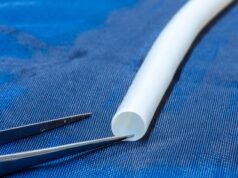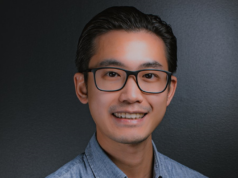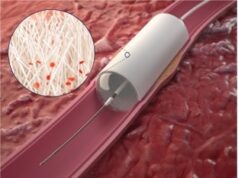
Dr Frank Veith is Professor and Vice-Chairman of Surgery at Montefiore Medical Center, the University Hospital for the Albert Einstein College of Medicine. Additionally, he occupies the William J. von Liebig Chair in Vascular Surgery at Montefiore, and is Chairman of the VEITHsymposium.Dr Frank Veith told Vascular News that he chose a career in medicine because he wanted to devote his life to helping people rather than exploiting them as some other professions do. Dr Veith graduated from Cornell University Medical School in 1955, and then trained in general surgery, performing his residency at Peter Bent Brigham Hospital, Harvard Medical School.
According to Dr Veith, he was attracted to the challenges associated with lung transplantation, however organ donors were scarce at this time, so through a process of “natural evolution” he entered Vascular Surgery.
Dr Veith explained that specializing in Vascular Surgery was a highlight in his career. “I got much better at what I did. I made the mistake early on of wanting to do everything and that was a very bad mistake. I was a jack of all trades and master of none.”
Influences
Veith highlighted Francis Moore, who was his chairman at Peter Bent Brigham Hospital as being very influential on him. The cardiothoracic surgeon Dwight Harken impressed Veith with the way he did things, his clinical orientation and with the idea of a large practice in a specialized area. Of Stanley Crawford, Veith said that he was “just the kind of individual that I wanted to be”. Dr Veith also mentioned Chiltern Crane, a vascular surgeon from whom he “gained a lot from a clinical perspective”, and the transplant and plastic surgeon Joseph Murray.
According to Veith, he takes pride in the fact that he has throughout his career taken on what were thought of as difficult and, which appeared to some, unsolvable problems. These included lung transplantation, limb salvage with vascular bypasses and endovascular surgery. Having done these procedures and promoted them to doubters, Veith has over time seen doubters become followers, accepting some of the things that he has said “but probably forgetting where they first heard it”.
VEITHsymposium
The VEITHsymposium is now coming up to its 31st meeting, which takes place this November. In 1973, Dr Henry Haimovici took the bold educational step of initiating the first vascular symposium anywhere in the world, which later became the Montefiore Vascular Symposium. According to Veith he became involved with the Montefiore vascular course in about the fourth or fifth year, and then “became responsible for it, and made it a much bigger and more international meeting.”
Dr Veith highlighted two other people who have made a significant contribution to the evolution of the meeting. Steve Levine is an administrative figure, who has an entrepreneurial relationship with industry, which has allowed the meeting to expand, and Jackie Simpson, who manages physician relationships and a myriad of other details.
Last year, the VEITHsymposium had around 2,000 attendees and Dr Veith said “Hopefully we will do better this year.” At the 2003 meeting, Senator Bob Dole was the invited speaker. “I don’t think that we will ever match the electricity that went along with Mr Dole, he was an endograft patient as well as a leading political figure,” said Dr Veith, “He is a hard act to follow and having him was wonderful.” Veith indicated that they did not know at the time of this interview who this year’s guest speaker would be, but revealed that they were eager for Congresswoman Carolyn McCarthy to participate. McCarthy has helped to take on congress in the cause of Vascular Surgery’s bid for an independent board.
Veith believes that the success of the VEITHsymposium is based on the fact that “it brings together all the things that are new and exciting, or that are going to be new and exciting, and offers vascular surgeons exposure to these”. He continued, “We collaborate with interventional radiology – so it is also multidisciplinary.”
Looking ahead to this year’s meeting Dr Veith said that many controversies will be aired and both sides discussed, and that he had recently heard from Dr Enrico Ascher about the topic of replacing angiography with duplex ultrasound for angioplasty and stenting, which Veith said could be very exciting.
The International Society for Vascular Surgery (ISVS) was founded at last year’s VEITHsymposium. According to Veith, the society now has 660 members and is continuing to recruit; one of the society’s goals is to see Vascular Surgery recognized as an independent specialty throughout the world.Independent Board
It is impossible to discuss the state of Vascular Surgery in the US without addressing the call for an independent board. Dr Veith describes himself as “a strong and frustrated proponent” for an independent Board of Vascular Surgery. Veith explained the situation, “We have encountered enormous opposition within organized medicine and surgery [to an independent Board of Vascular Surgery]. Of course we are fighting but because of the enormous power of the establishment we are not getting where we should. We have been turned down by the American Board of Medical Specialties (ABMS).”
Veith described the ABMS as “an old boys club that is very good at maintaining the status quo, not allowing the specialty to evolve and be recognized in accordance with its development”.
“We have been trying to establish it [an Independent Board] for 10 years now and have been frustrated as we have tried to go through the proper channels either due to the self-interests of others or for reasons that we just don’t know. In addition, they have delayed our appeal, after having been turned down,” Veith said.
He continued, “We are looking at other avenues, but the problem with the ABMS is that there is no oversight. There is no way of making them fulfill their own goals and purposes. They are an independent, autocratic, incestuous group that no one has oversight over. So that is why we are seeking congressional help. ABMS actions result in poor care and don’t allow vascular surgeons to be as good throughout the country as they could be. In addition, the ABS continues to promote the idea that general surgeons should be able to do vascular surgery. The General Surgery Certificate should not be a basis for doing vascular surgery, and it still is. The American Board of Surgery (ABS) and the ABMS are wrong on this issue. As a result of that some patients suffer and die. We think this is a matter that the government should investigate and perhaps become involved in and that is why we are seeking congressional help. The whole point of our effort has been to try to act within the system but it is just not going to work. The system is dysfunctional. There is no official body, overseeing this semi-official body, the ABMS, which is very much influenced by the ABS.”
According to Dr Veith vascular surgeons have also been let down by a number of leading and ‘collaborating’ vascular surgeons who have been misguided and in league with the ABS, and have promoted their agenda which has not always been good for Vascular Surgery.
“These vascular surgeons might be right if the situation were completely hopeless, and we could never have our own Board. However, it is not completely hopeless. Moreover, if you discuss this issue with a lay person, like a congressman, judge, lawyer or businessman, they say it is a ‘no brainer. You should have an independent Board’.”
This minority of general surgery oriented vascular surgeons, according to Veith, is leaving the control of Vascular Surgery in the hands of general surgeons, who have a conflict of interest. “They want to protect their turf and they don’t want us to act in the interest of vascular patients or vascular surgeons,” he said.
“Ultimately it comes down to power, money and control.”
Veith indicated he believed that the ABS strategy towards Vascular Surgery has three components:
“The Primary Certificate in Vascular Surgery doesn’t fully meet the needs of vascular surgeons,” said Veith, although, he admitted, “it has some advantages. Therefore, the American Board of Vascular Surgery supported the Primary Certificate in Vascular Surgery, but only because it is widely regarded as a way station to a fully independent Board of Vascular Surgery”, he said. “We just took a poll of vascular surgeons in North America, and 76% of them are in support of the pursuit of an independent Board.”
“The focus on endovascular techniques makes having an independent Board more compelling. General surgeons can’t learn all endovascular techniques and all other elements of Vascular Surgery. However, the ABS maintains that Vascular Surgery will always be a part of general surgery,” said Veith.
Vascular surgeons have and should continue to take a leading role in endovascular treatments, because they are the individuals who devote their whole career to non-cardiac vascular disease, explained Veith. “If a patient goes to a physician who can only perform one kind of treatment, that physician is more likely to perform that kind of treatment than he should be. Whereas the vascular surgeon can do an open procedure or an endo procedure, and assuming he is well trained, which is why we need to control our training, he can do either equally well. He will then pick what is best for the patient not what is best for him.”
Veith continued, “I think that the control of vascular training should be in the hands of vascular surgeons. My feeling is that you don’t need many years of general surgery, maybe one or two, the rest of the time should be spent training in what you are going to do. It is nice to have broad training, but it is impractical as the trainee would be 50 years old if he had totally broad training. A vascular surgeon doesn’t need to know about breast surgery or thyroid surgery. He needs to learn all the things that are associated with the very complex, rapidly advancing field of Vascular Surgery. There is admittedly some overlap with general surgery but general surgeons should not be doing complex vascular reconstructions, which is the case at the moment, and patients are going to suffer. That is why we need an independent Board.”
Closing message
Dr Veith concluded the interview with this message, “The field of Vascular Surgery is evolving rapidly and becoming increasing complex with medical treatment, conservative treatment, endovascular treatment and open treatment. Vascular Surgery is, in fact, a defined specialty, and it should be recognized as such by other areas of medicine and by the public. This requires a Board, and such a Board will serve the public better.
Frank J. Veith
Appointments previously held
1962: Asst. in Surgery, Peter Bent Brigham Hospital and Harvey Cushing Research Fellow in Surgery, Harvard Medical School
1962-63 : Arthur Tracy Cabot Teaching Fellow, Harvard Medical School
1963-64 : Asst. in Surgery, Peter Bent Brigham Hospital; Research Fellow in Surgery, Harvard Medical School; and NIH Postdoctoral Fellow, Harvard Medical School
1964-1967 : Asst. Professor of Surgery, Cornell University Medical College
1964-1967 : Asst. Attending Surgeon, Bellevue Hospital
1964-1967 : Surgeon to Outpatients, New York Hospital
1967-1971 : Associate Professor of Surgery, Albert Einstein College of Medicine
1967-1971 : Associate Attending Surgeon, Montefiore Hospital and Medical Center
1967-1976 : Co-Director, Transplant Unit, Montefiore Hospital and Medical Center
1971- : Professor of Surgery, Albert Einstein College of Medicine
1971-: Attending Surgeon, Montefiore Medical Center
1977-: Consultant in Vascular Surgery, The Englewood Hospital, Englewood, New Jersey
1972-1976 : Chief, Vascular Surgical Service, Montefiore Hospital and Medical Center
1976-1989 : Director, Transplant Program, Montefiore Medical Center-Albert Einstein College of Medicine
1983-: Consultant in Vascular Surgery, Beth Abraham Hospital
1991-1992 : Professor and Interim Chairman, Combined Department of Surgery, Montefiore Medical Center-Albert Einstein College of Medicine
1991-1992 : Program Director, Residency in General Surgery, Albert Einstein College of Medicine-Montefiore Medical Center
Selected offices
1979-1984 : President and Vice President, The New York Society for Cardiovascular Surgery
1986-1989 : Treasurer, Society for Vascular Surgery
1987-1990 : President, New York Regional Vascular Society
1993-94 : President, Eastern Vascular Society
1993 : Charter Member, International Society of Endovascular Specialists
1993 : President, Gulf Coast Vascular Society
1994 : President, Carolina Vascular Society
1995-96 : President, Society for Vascular Surgery
1998 : 1st Vice President, International Society for Carotid Artery Therapy,
2001 : ACS Representative from SVS
2001 : Board of Governors of ACS
Honors
1962 : Commendation Medal, US Air Force
1965-74 : Career Scientist, Health Research Council of the City of New York
1964-69 : Markle Scholar in Academic Medicine
1978 : Annual Residents Award as Attending of the Year in the Department of Surgery at Montefiore Medical Center, Albert Einstein College of Medicine,
1988 : Special Residents Career Award for Commitment to the Surgical Residency Program, Montefiore Medical Center -Albert Einstein College of Medicine
1996-now : Listed as one of the “Best Doctors in America”. American Health
2001 : NYS Medical Society Albert O. Bernstein Award













